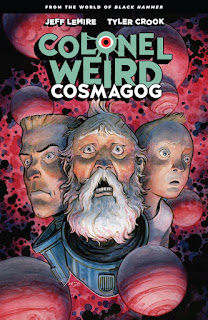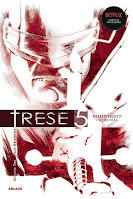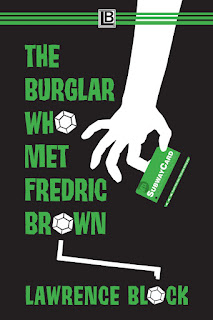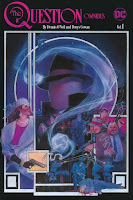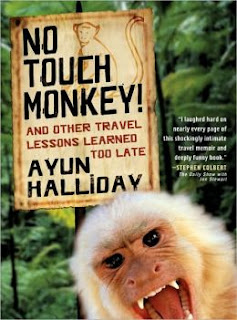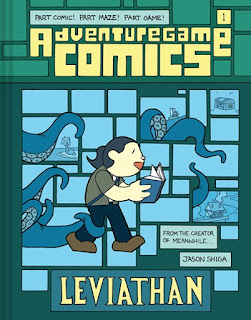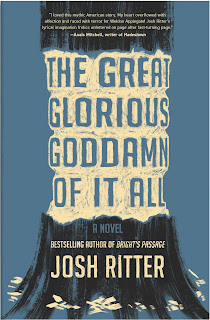This was Le Carre's second spy novel, following up
The Spy Who Came in From the Cold two years later and, according to the author's 1991 introduction in this edition, both designed to be a more "realistic" view of spycraft and, in the event, not nearly the critical success
Cold was.
For myself, reading The Looking-Glass War fifty-plus years later, I was struck at how much of the tone and atmosphere of Le Carre's drab London offices with their complicated security arrangements and political maneuverings has influenced Charles Stross's Laundry books. A pretty obvious point, clearly: it's not a surprise, but seeing the great originator of a style or theme always strikes differently when you're more familiar with a modern take on it. So I may see it through a lens of later books, and I apologize for that.
In that introduction, Le Carre all but declares "everyone took the ending of Cold to be romantic and tragic, so this time I tried to be even more obvious that these guys are mostly well-meaning but really bad at what they do, and what they do is destructive and pointless at the best of times, OK?" And perhaps the critics did get it, and that was why they - at least in the UK, as he makes the distinction - were less happy with a book that said their country's spies were often infighting, badly trained dilettantes rather than Flemingesque heroes.
The book takes place in the mid-60s, in "the Department," a secret service whose remit is military intelligence. "The Circus," the agency featured in most of Le Carre's books - the one George Smiley works for - is devoted to political intelligence, and reports up to a different Ministry. The two services are roughly rivals, though in a chummy British way, and the Circus has been much more successful in their quiet rivalry, with the Department shrinking in size and importance and capabilities since The War.
(Everything in Looking Glass is in reference to The War. If you don't instantly know which one, this might not be a book you can profitably read.)
We open with a Department agent in Finland. He's a desk guy from London, out in the field for the first time ever, and ill-prepared for it. A commercial airline pilot is supposed to meet him in the airport bar, quietly hand over film he just shot, of a potentially interesting site in East Germany, and then go. But the pilot is late, the airport is closing, and the agent is no good at keeping a low profile. Before long, the agent is killed in a hit-and-run, trudging back through the snow to his hotel.
So the Department needs to send another desk guy from London - the "young hotshot" of the office, in that he seems to be the only new person hired since The War - to retrieve the first guy's body, and, more importantly, that film. He is equally untrained, and various bits of bureaucratic incompetence and/or malice make his job even more difficult.
The missing film could potentially show a new Soviet missile site in East Germany, pointed West. In this just-post Cuban Missile Crisis world, that would be a serious threat to the UK and NATO, but - even more importantly to the Department - it would show that their work is actually important, give them access to the top levels of power, and drive larger budgets and scope for action for the future.
The Department is a shell of what it was during The War. Everyone knows this. It has lost all capacity for action in the field; the Circus is the only one with that expertise now. But maybe they can retrain one of their old contacts, from The War, and send him in to see, on the ground, if that missile site is real, and reclaim their glory days once again!
And maybe they can do that while begging aid from the Circus, pretending this is all a training exercise. And maybe the Department thinks the Circus believes that pretense. The Department, after all, is really out of practice at this spy stuff.
Looking Glass is divided into three sections, which get longer as they go. First the initial agent, then second guy, then a real clandestine asset inserted deep into the field. They all mean well. They all work reasonably hard. They all want to do right by their country. They are all incompetent in many ways, large and small. It will not end well.
OK - not well for the Department. The Circus will see its position substantially strengthened. And isn't that what's most important, really?
This is a dark and cynical book, which is entirely appropriate for Cold War spycraft; Le Carre invented that style and entire genre. I suspect this is the book that crystalized that stance for him, though I understand later books focus on the Circus...so I think we later learn they are not "the competent ones" in this formulation, just the ones we don't see their incompetencies in this book. As is entirely appropriate for a book about spies, nearly everything important here is implied rather than told: Le Carre hints (rather heavily at times) but never spells out details.
There's a histrionic moment at the ending that's a bit too much. I can see why it's there, but it's from a different style of book, from a different kind of writer. My guess is that Le Carre learned not to do things like that in the future. Other than that, Looking Glass is as clear and cold as the Finnish winter it opens in.



